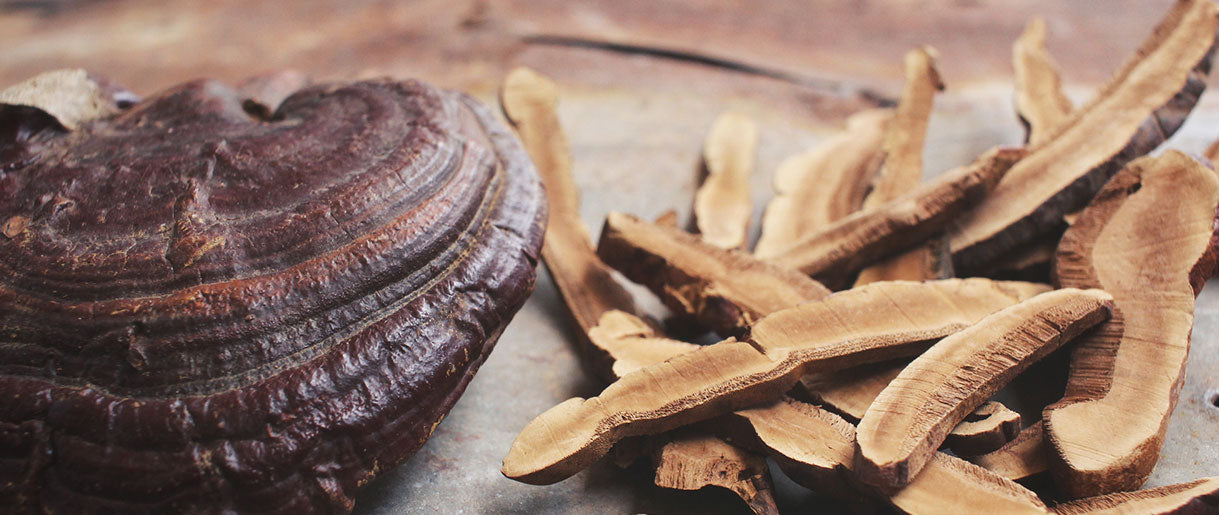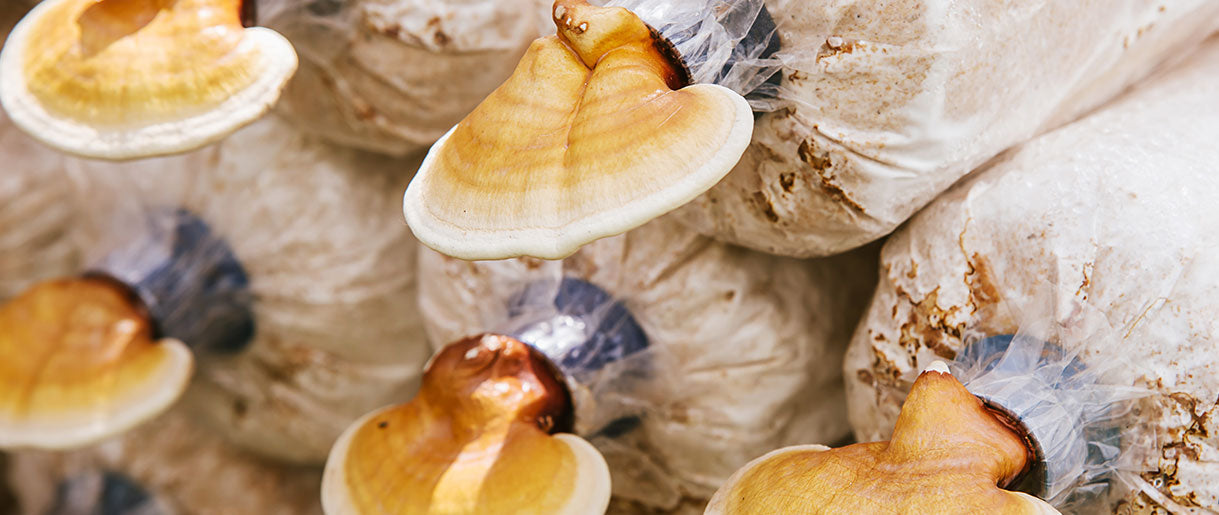Mushrooms have been used medicinally for thousands of years due to their diverse and adaptable health effects. With the mainstreaming of functional medicine and holistic nutrition in recent years, there has been a newfound interest in these beautiful superfoods.
Two species, particularly, are making headlines for their beneficial health impacts — Reishi vs. Turkey tail. You can select which of these fantastic mushroom species is appropriate for you by comparing their similarities and differences.
This article will encapsulate Turkey tail mushroom vs. Reishi
Overview Of Reishi Mushroom

Reishi(1), also known as Ganoderma lucidum, has been mentioned in medicinal books for over 2000 years. Most notably, Chinese Taoist monks described utilizing it to achieve serenity and improve their meditative activities. Chinese rulers regarded Reishi as a "mushroom of immortality" and utilized it to increase longevity. Reishi was named the most beloved of the great herbs, which are thought to enhance a long life, boost qi, healthy aging, and make the body light.
Herbalists refer to Reishi as the "King of Medicinal Mushrooms" because of its ability to support multiple systems in the body. It's a giant, dark mushroom with a woody texture and a glossy exterior. The word lucidus means "brilliant" or "shiny" in Latin and alludes to the glossy appearance of the mushroom's surface. In China, G. lucidum is known as Lingzhi, whereas in Japan, the Ganodermataceae family is known as Reishi or Mannentake.
Many active compounds(2) have been discovered in Reishi, including polysaccharides, triterpenoids, fatty acids, nucleosides, steroids, amino acids, proteins, and alkaloids. Polysaccharides and triterpenoids have gotten a lot of interest because of their high content in fungi, various structures, and key bioactivities. The primary medicinal benefit of Reishi mushroom is that it can aid restful sleep and is a potent immunomodulator.
Overview Of Turkey Tail Mushroom

Trametes Versicolor, or Turkey Tail mushroom, is a common and local mushroom to many people worldwide. It grows on dead logs worldwide and got its name because of its brown and tan rings resembling turkey tail feathers.
Turkey tail mushrooms' most well-known active components are polysaccharide K (PSK) and polysaccharopeptide (PSP). PSK and PSP are approved mushroom products used to treat cancer in Japan. Anti-oxidants, beta-glucan, fatty acids, sterols, and phenolic compounds are also present.
Turkey tail has been utilized in TCM (Traditional Chinese Medicine) to help with digestion, lung health, body fluid balance, and vitality. A Turkey tail derivative has been utilized to enhance the immune system in Japan and China(3). Turkey tail contains one of the most significant quantities of beta-glucans of any fungus, which can help keep our immune systems healthy over time.
The mushroom's main medical effect is that it increases immune system activity. Turkey tail boosts immune function by boosting natural killer cells and activating cytokine synthesis, among other things.
Now, what is the difference between Reishi mushroom vs Turkey tail? And which one is right for you?
Let’s find out next.
Health Benefits And Uses Of Reishi Vs. Turkey Tail

Navigating which medicinal mushroom you should go with can be a little confusing. So we’ve broken down the benefits and uses of Turkey tail and Reishi.
Benefits of Turkey Tail vs. Reishi
Turkey tail benefits may include the following when consumed as a supplement:
- Boosted immunity.
- Anti-cancer effects.
- Improved cognitive function.
- Lower blood sugar in type 2 diabetes.
- Improved gut health.
- Anti-oxidant properties.
- Increased exercise performance.
- Reduced inflammation.
The top health benefits of Reishi include the following:
- Reduce stress.
- Fights inflammation.
- Immune system support.
- Anti-oxidant properties.
- Supports heart health.
- Promotes liver detoxification.
- Protects the brain.
- May help manage blood sugar in type 2 diabetes.
- Improve skin health.
- Fights fatigue and provides energy.
How Are Turkey Tail And Reishi Used?
Turkey tail supplements are available in powder, capsule, and tincture forms. Some Turkey tail supplements contain the entire mushroom, including the fruit body and mycelium, the root structure.
The mushrooms are dried before being ground into a powder. Other Turkey tail supplements contain extracts of the mushroom's therapeutic components. These products have a high concentration of health-promoting compounds offering a wide range of benefits.
Reishi mushrooms are regarded as too tough to consume and have only been used medicinally. Ganoderma lucidum is available in various forms, including powders, extracts, and tea, and is derived from several components of the mushroom, including mycelia, spores, and fruiting body. Water-soluble Reishi extract powders can be put into beverages such as tea or water.
Active Compounds And Nutritional Content

The polysaccharides found in Reishi mushrooms have been linked to immunological functions, and when taken over time, Reishi may significantly support your immune system. It may also promote a good night's sleep and mental clarity, reduce stress and anxiety, promote lung and respiratory health, and promote blood sugar balance.
On the other hand, Turkey Tail's distinctive claim to fame is PSK and PSP, officially accepted as cancer treatments in Japan, boosting the survival rate of people living with certain tumors and the immune system of those getting chemotherapy. The mushroom improves immune function by promoting cytokine synthesis, boosting the number of natural killer cells, and performing other immune-stimulating tasks.
Turkey tail polysaccharides with protein-binding properties have the most research-backed immuno-supportive benefits. When administered alone or in combination with synergistic herbs, these substances may stimulate critical types of immune cells, such as T cells.
Choosing Between Reishi And Turkey Tail

Health goals and individual requirements determine the choice between Reishi and Turkey tail. When selecting a mushroom, consider your unique health condition, desired benefits, and personal preferences.
The best way to start is to figure out what benefits you want. Here are a few of the most important:
- Calming effect and stress support: Reishi
- Immune support: Reishi and Turkey tail
- Longevity: Reishi
- Skin health: Reishi
- Gut health: Turkey tail
- Anti-inflammatory: Reishi and Turkey tail
- Prebiotic: Turkey tail
FAQs About Reishi vs. Turkey tail
Can I Take Reishi And Turkey Tail Together?
It is possible to combine Reishi with Turkey tail. Because these mushrooms act in synergy, we recommend considering their separate benefits and working from there. However, if you're new to medicinal mushrooms, we recommend starting with only one and then adding the other.
Can You Take Reishi Every Day?
Taking Reishi supplements daily can be a safe and effective strategy for many people to reap the full benefits. Adults typically take 1400-5400 mg of Reishi mushroom by mouth daily, usually in divided doses.
What Cancer Does Turkey Tail Fight?
For decades, krestin, a preparation derived from Turkey tail, has been utilized as a supportive therapy in cancer treatment in Japan. Not only does this include breast cancer but also gastric, lung, liver, and pancreatic cancer.
Key Takeaways
As we’ve already discussed, Reishi vs. Turkey tail benefits. Reishi should be your first choice for supporting your immune system, lowering stress, anxiety, depression, and fatigue. Turkey tail, on the other hand, helps in the battle against cancer cells.
Which mushrooms you want to try will be determined by the results you seek. Interestingly, medicinal mushrooms have a synergistic effect, which means that the therapeutic components in each fungus complement one another inside your body.
References
- Reishi Mushroom, Ganoderma lucidum, (1)http://www.medicinacomplementar.com.br/biblioteca/pdfs/Fitoterapia/fi-0405.pdf
- Advances in research on the active constituents and physiological effects ofGanoderma lucidum, (2)https://biomeddermatol.biomedcentral.com/articles/10.1186/s41702-019-0044-0
- Medicinal Mushrooms (PDQ®), (3)https://www.ncbi.nlm.nih.gov/books/NBK424937/








Let Us Know Your Comments